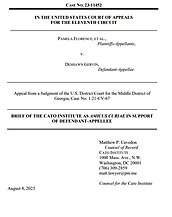Learn more about Cato’s Amicus Briefs Program.
In 2011, Appellee DeShawn Gervin was sentenced to probation with only one condition: do not return to five counties in south Georgia. He complied fully. But he was arrested in 2019 based on a 2012 arrest warrant sought by a probation officer. The officer accused him of not reporting for probation — even though he never had to. The officer would have realized that if she had bothered to review Mr. Gervin’s sentence before seeking the arrest warrant. But Mr. Gervin spent 104 days in jail because she did not.
Mr. Gervin challenged the officer’s actions as “malicious prosecution.” The officer responded that malicious prosecution suits concern only “criminal” proceedings and not probation-revocation actions. The U.S. district court disagreed and held that Mr. Gervin’s suit could go forward. The officer appealed to the Eleventh Circuit.
Cato filed an amicus brief asking that court to uphold the district court’s decision and keep Mr. Gervin’s lawsuit alive. Back in 1871 when Section 1983 was enacted, malicious prosecution could be brought for any baseless lawsuit that led to the plaintiff’s arrest or seizure of the plaintiff’s property, regardless of whether that suit was criminal or civil in nature. Courts back then would have let Mr. Gervin sue for being arrested and held in jail for three and a half months without probable cause. So should courts today.

This work is licensed under a Creative Commons Attribution-NonCommercial-ShareAlike 4.0 International License.

